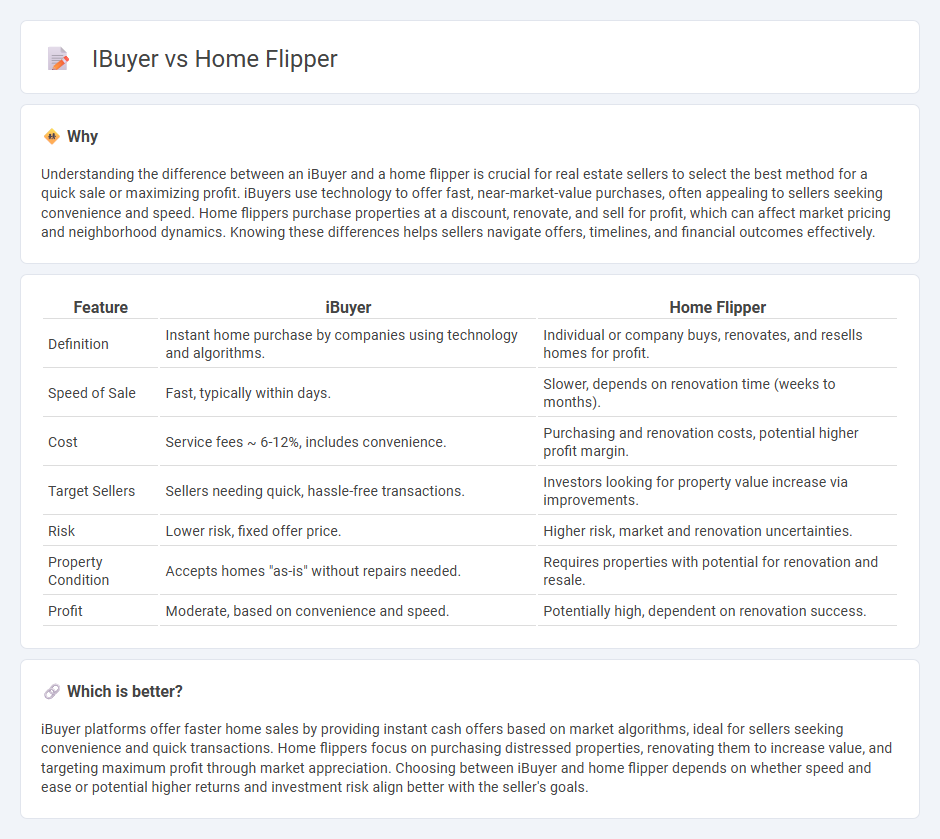
iBuyers use technology and data analytics to make instant offers on homes, facilitating faster and more convenient real estate transactions. Home flippers purchase properties below market value, renovate them, and sell for a profit, often requiring significant time and investment. Explore the differences between iBuyers and home flippers to determine which approach suits your real estate goals.
Why it is important
Understanding the difference between an iBuyer and a home flipper is crucial for real estate sellers to select the best method for a quick sale or maximizing profit. iBuyers use technology to offer fast, near-market-value purchases, often appealing to sellers seeking convenience and speed. Home flippers purchase properties at a discount, renovate, and sell for profit, which can affect market pricing and neighborhood dynamics. Knowing these differences helps sellers navigate offers, timelines, and financial outcomes effectively.
Comparison Table
| Feature | iBuyer | Home Flipper |
|---|---|---|
| Definition | Instant home purchase by companies using technology and algorithms. | Individual or company buys, renovates, and resells homes for profit. |
| Speed of Sale | Fast, typically within days. | Slower, depends on renovation time (weeks to months). |
| Cost | Service fees ~ 6-12%, includes convenience. | Purchasing and renovation costs, potential higher profit margin. |
| Target Sellers | Sellers needing quick, hassle-free transactions. | Investors looking for property value increase via improvements. |
| Risk | Lower risk, fixed offer price. | Higher risk, market and renovation uncertainties. |
| Property Condition | Accepts homes "as-is" without repairs needed. | Requires properties with potential for renovation and resale. |
| Profit | Moderate, based on convenience and speed. | Potentially high, dependent on renovation success. |
Which is better?
iBuyer platforms offer faster home sales by providing instant cash offers based on market algorithms, ideal for sellers seeking convenience and quick transactions. Home flippers focus on purchasing distressed properties, renovating them to increase value, and targeting maximum profit through market appreciation. Choosing between iBuyer and home flipper depends on whether speed and ease or potential higher returns and investment risk align better with the seller's goals.
Connection
iBuyers and home flippers are connected through their focus on quick property transactions and value addition. iBuyers use technology to make instant offers on homes, providing sellers with fast sales, while home flippers purchase undervalued or distressed properties to renovate and sell at a profit. Both entities play key roles in facilitating liquidity and revitalizing real estate markets.
Key Terms
Holding Period
Home flippers typically hold properties for several months while renovating and upgrading, aiming to increase market value before selling. In contrast, iBuyers offer near-instant sales, often closing within days and minimizing the holding period to reduce market risks. Explore the differences in holding period strategies to determine which option fits your investment goals best.
Purchase Method
Home flippers typically purchase properties through traditional real estate transactions, often involving negotiations, inspections, and financing contingencies to acquire homes below market value for renovation and resale. iBuyers use algorithm-driven instant offers, streamlining the purchase process by minimizing the need for listings and showings, providing sellers with quick, cash-based transactions. Explore further to understand how these purchase methods impact the overall real estate experience and investment potential.
Renovation Scope
Home flippers typically engage in extensive renovation projects, transforming undervalued properties to maximize resale value, often handling structural repairs, interior redesign, and aesthetic upgrades. In contrast, iBuyers generally focus on quick transactions involving minimal renovation or cosmetic touch-ups to maintain market freshness and speed up resale. Explore deeper insights into how renovation scope impacts profitability and turnaround time in these two approaches.
Source and External Links
House Flipper Home Design - A mobile game where you run your own renovation company, buying, renovating, and selling houses while managing interior design and client orders.
House Flipper for Nintendo Switch - A game offering a unique experience as a one-man renovation crew, focusing on buying, repairing, and sellinghouses with a wide range of interior design options.
House Flipper: Home Design - A mobile adaptation of the popular simulation game where you flip houses and become a renowned interior designer by completing orders and decorating interiors.
 dowidth.com
dowidth.com